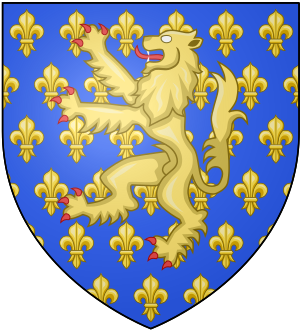John Beaumont (judge) facts for kids
John Beaumont lived in England around the year 1550. He was an important judge and held the title of Master of the Rolls, a high position in the English legal system. He lived at Grace Dieu Manor in Belton, Leicestershire.
Family Background
John Beaumont came from a notable family. He was the great-grandson of Sir Thomas Beaumont of Bachuile, who lived in Normandy. He was also the great-great-grandson of John Beaumont, 4th Baron Beaumont (1361–1396). This ancestor was a Knight of the Garter, which is a very old and respected order of knighthood in England.
Life as a Lawyer and Judge
John Beaumont began his legal career in the city of Leicester. In 1529, the city agreed to pay him a fee for his legal advice.
In 1534, he helped with a survey of churches in the county. This survey was ordered by the king.
He became a "reader" at the Inner Temple in 1537. This meant he taught law to other students. He was appointed a "double reader" in 1543, showing he was highly regarded. In 1547, he became the treasurer of the Inner Temple, managing its money.
In 1550, John Beaumont became the Recorder of Leicester, a judge for the city. In the same year, he was promoted to Master of the Rolls. This was a very powerful job in the legal system. He was even asked to hear cases for the Lord Chancellor, the highest judge in England.
Trouble and Consequences
However, John Beaumont soon faced serious problems. He used his position as a judge to help himself unfairly.
He made a secret deal with a woman named Lady Anne Powis. She was trying to get back some land in his court. They agreed that if she won the case, she would sell the land to him for a certain amount of money. This kind of deal was against the law.
He also tried to make Lady Powis's claim stronger by creating a fake document. He forged the signature of a powerful nobleman, the Duke of Suffolk, on a deed. This deed made it look like the Duke had given the land to Lady Powis.
On top of that, John Beaumont took a large amount of money that belonged to the king. This money came from a special court called the Court of Wards and Liveries. He also hid a crime committed by his servant.
In February 1551, John Beaumont was arrested for these actions. He was put in prison. He later admitted that he had done these things. He lost his job as Master of the Rolls in May 1552. To pay back the king, he had to give up all his lands and belongings.
Family and Legacy
John Beaumont was married to Elizabeth Hastings. She was the daughter of Sir William Hastings. They had two sons.
Their elder son was Francis Beaumont (MP), who also became a judge. Francis's son was the famous playwright Francis Beaumont (who died in 1616).
Their younger son, Henry, was also a member of the Inner Temple, but he died at a young age.
After John Beaumont's death, his wife Elizabeth was able to get back some of their family land, including Grace-Dieu in Leicestershire. This was because of a legal detail in how the land was set up.
Later, there was an important legal case involving John Beaumont's family. It was about who should inherit the Grace Dieu estate. This case helped to create new rules in English law about how land could be passed down through families.
 | Sharif Bey |
 | Hale Woodruff |
 | Richmond Barthé |
 | Purvis Young |


